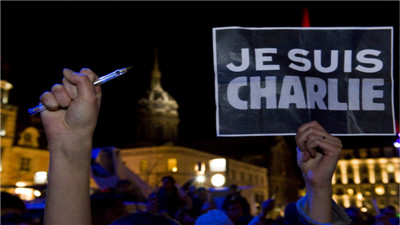(单词翻译:单击)
The murder of satire is no laughing matter. The horrifying carnage at Charlie Hebdo is a reminder, if ever we needed it, that irreverence is the lifeblood of freedom. I suppose it is some sort of backhanded compliment that the monsters behind the slaughter are so fearful of the lance of mirth that the only voice they have to muffle it is the sound of bullets. Magazines such as Charlie Hebdo are in the business of taking liberties, even outrageous ones, but they exist so that we never take the gift of disrespect for granted.
对讽刺艺术的扼杀是件需要严肃对待的事。发生在《查理周刊》(Charlie Hebdo)的这场恐怖屠杀提醒我们(如果我们需要提醒的话):“不敬”是自由的命脉。执行这场杀戮的恶魔对欢笑的长矛是如此恐惧,以至于他们只能用枪声代替话语,以求封杀这种欢笑,我认为这是种间接的夸赞。《查理周刊》这样的杂志以无礼的(甚至是放肆的)嘲弄为主业,但他们存在的价值,就在于使我们永远不会想当然地对待“不敬”这份礼物。

Liberty and laughter have been twinned in the European tradition for more than three centuries and have together proclaimed as precious the right to ridicule. Graphic satire first arose as a weapon in the atrocious and prolonged religious wars that divided Catholics and Protestants. For Protestants the printing press was the answer to the imagery of the Roman church by which, as they saw it, heretics and sceptics were brought to book. So they invented an anti-iconography in which popes were turned into fantastic monsters, and kings into ministers of slaughter. The Dutch, who invented the illustrated news gazette in the middle of the 17th century, saw themselves as the victims of religious fury. Their graphic counter-attack began with popular illustrated histories of their rebellion against the Spanish monarchy — with the Duke of Alva their favourite bogeyman. It broadened into a regular weapon of partisan polemics inside the Republic as well as against foreign threats to “Holland’s Freedom”.
三个多世纪来,自由与欢笑在欧洲传统里一直成双成对,一起被宣称为嘲讽的珍贵权利。讽刺漫画首次作为武器出现,是在天主教徒与新教徒之间残酷而旷日持久的宗教战争时期。对新教徒来说,印刷机是对他们眼中罗马教会利用绘画来迫害异教徒和怀疑者的回答。于是他们发明了一种反肖像,将教皇画成虚构的恶魔,而国王成了杀戮执行者。自视为宗教愤怒受害者的荷兰人在17世纪中叶发明了新闻画报。他们的漫画反击战起从流行的历史漫画开始,主题是荷兰人抗击西班牙王室,而阿尔瓦公爵(Duke of Alva)是他们最喜欢描绘的反面人物。随后攻击对象拓宽,新闻画报既被用来抵御“荷兰的自由”所面临的外来威胁,也成了共和国各党派论战的常用武器。
The first great modern graphic satirist was Romeyn de Hooghe, enlisted by William III at the end of the 17th century in his relentless war to the death with Louis XIV. De Hooghe obliged with sprawling cartoons representing the wars against the French monarch and his allies as a battle between liberty and religious despotism. The satirists again saw themselves leading the cavalry charge against the bigots. And it was in the interests of the Protestant states to let them off the leash.
第一位伟大的现代讽刺漫画艺术家是罗曼•德霍夫(Romeyn de Hooghe)。17世纪末威廉三世(William III)与他的死敌路易十四(Louis XIV)进行一场残酷的战争时,招揽了德霍夫。德霍夫受命创作出大量漫画,将威廉三世与法国国王和其盟友之间的这场战争描绘为自由与宗教专制之间的战斗。讽刺漫画家们再次视自己为引领着骑兵队冲向宗教盲从者们的先锋队。而放手让他们创作符合新教国家利益。
The golden age of no-holds-barred graphic satire in the 18th century arose on the tomb of religious warfare. But it was also made possible, in Britain especially, by the space opened when no one political force or institution could command a monopoly of power. Though the Whigs — grandees — dominated government for much of the century, it was never to the total exclusion of opposition, and as with all oligarchies, factions arose, each of which turned to the caricaturists to puncture the pretensions of their enemies, expose their hypocrisies, and bring down the mighty in a gale of scornful hilarity.
18世纪,无拘无束的讽刺漫画在宗教战争的坟冢上改头换面,迎来黄金时代。但这一黄金时代之所以能够到来,还有一个原因是(就英国而言尤其如此):没有哪一种政治势力或机构能够垄断权力。尽管代表权贵的辉格党(Whigs)在18世纪的大部分时间里主导政府,但它始终没有完全把反对党赶出政治舞台,而且如寡头政治一贯的情况那样,派系出现了,各个派系都诉诸讽刺漫画来戳穿敌对派系的伪装,揭露他们的虚伪,在一片欢笑的讥讽中将位高权重者拉下台。
Thus it fell to the British to reinvent politics as comedy, and they went at it, on stage and in print, with a ferocious energy that has never been surpassed. Even now in the US, the enemy of democracy — after the poison of money — is reverence; with satire penned into the safe fold of late-night television.
于是,以喜剧形式重新解读政治的任务落在了英国人肩上,他们努力不辱使命,在舞台上,在书刊中,他们奉献出了从未被超越的热情。即便是在如今的美国,民主的敌人——除了金钱的毒化以外——仍然是敬畏权势;讽刺电视节目被局限于安全的午夜档围栏中。
But in the great age of graphic attack politics there was nowhere to run to and no great institution or person was safe from the barbs of comedy. The Church of England; dissenters such as the Methodists; the Bank of England; leading politicians and the royal family itself were all fair game.
但在那个以漫画为政治攻击武器的伟大时代,没有地方可以让你躲过攻击,没有哪个伟大的机构或人物能够免受喜剧作品的讥讽。英国国教会(Church of England)、卫理公会教徒等非英国国教信徒、英国央行(Bank of England)、政治要人、以及皇室家庭,都是可攻击的对象。
Satire became the oxygen of politics, ventilating healthy howls of derision in coffee houses and taverns where caricatures circulated every day and every week. James Gillray, the greatest of all the caricaturists, was in such demand that Hannah Humphrey, his publisher, would rent out entire albums of his choicest items for a night’s or a weekend’s entertainment. Good fun was to be had by all perusing images: a grossly bloated Prince of Wales recovering from a night’s dissipation; William Pitt, prime minister, as a toadstool growing out of a dunghill; or a cartoon of Queen Charlotte, pendulous breasts nakedly exposed, holding at bay the prime minister and the Lord Chancellor.
讽刺成为了政治的氧气,有了它,才有了咖啡馆和酒馆中生气勃勃的嘲讽,在那些地方,人们每天、每周都在传阅各种讽刺漫画。最伟大的讽刺漫画家詹姆斯•吉尔雷(James Gillray)当年是如此受欢迎,以至于他的出版人汉娜•汉弗莱(Hannah Humphrey)会把他的全套精选作品集出租一个晚上或一个周末,供人们娱乐。一幅幅漫画为人们带来过无数欢乐:从彻夜狂欢中回过神来的大腹便便的威尔士王子(Prince of Wales);首相威廉•皮特(William Pitt)化身毒蘑菇,插在一坨粪中;夏洛特女王(Queen Charlotte)裸露着下垂的乳房,与首相和大法官保持安全距离。
Gillray was arrested only once — for a cartoon of politicians kissing the bottom of a royal newborn — and never imprisoned. Whatever the liberties he took, no harm befell him. The great tradition of ridicule passed to heirs in Britain, then to America and Europe: to Daumier and Cruikshank; the begetters of Krokodil and Private Eye, Spitting Image and Canard Enchainé as well as Charlie Hebdo.
吉尔雷只被逮捕过一次,是因为一幅政客们亲吻皇室新生儿屁股的漫画;他从未被投入监狱。无论他如何无礼,伤害从未降临他头上。讽刺的伟大传统在英国一代代流传,然后又传到了美国和欧洲大陆:克鲁克香克(Cruikshank)和杜米埃(Daumier);《鳄鱼》杂志(Krokodil)、《侦探》杂志(Private Eye)、模仿秀Spitting Image、《鸭鸣报》(Canard Enchainé)、以及《查理周刊》的主办者,都是这种传统的传人。
Yesterday there was a bloody attempt to wipe the smile from our faces. But though the self-righteous have killed the satirists they will never annihilate satire itself. Just the opposite. From now on, Charlie Hebdo will be the rallying point for all those who cherish life and laughter over the death cult of sanctimonious gloom. So we owe it to the fallen to remind ourselves, amid the blood, grief and rage, that just because the unhinged perpetrators are murderers does not mean they are also not clowns.
本周三,有人试图通过血腥暴力来抹掉我们脸上的笑容。但是,尽管那些自以为替天行道的枪手杀害了讽刺漫画家,但他们永远不可能消灭讽刺艺术本身。恰恰相反,从现在开始,《查理周刊》将成为所有珍爱生命和欢笑、厌恶那种信奉死亡和伪善之邪教的人们的旗帜。因此,为了让逝者不白白死去,我们也应该在眼下血腥、悲痛和愤怒的氛围中提醒自己,仅仅因为那些疯狂的行凶者杀了人,并不意味着他们就不是小丑。


